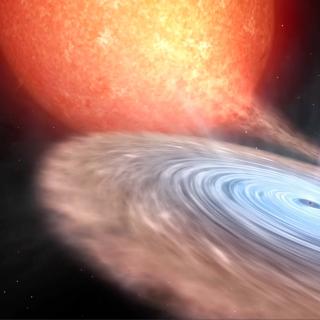Bibcode
Hynes, R. I.; Robinson, E. L.; Terndrup, D. M.; Gandhi, P.; Froning, C. S.; Wagner, R. M.; Starrfield, S.; Dhillon, V. S.; Marsh, T. R.
Bibliographical reference
Monthly Notices of the Royal Astronomical Society, Volume 487, Issue 1, p.60-78
Advertised on:
7
2019
Citations
11
Refereed citations
10
Description
We present a serendipitous multiwavelength campaign of optical
photometry simultaneous with Integral X-ray monitoring of the 2015
outburst of the black hole V404 Cyg. Large-amplitude optical variability
is generally correlated with X-rays, with lags of order a minute or less
compatible with binary light travel time-scales or jet ejections. Rapid
optical flaring on time-scales of seconds or less is incompatible with
binary light-travel time-scales and has instead been associated with
synchrotron emission from a jet. Both this rapid jet response and the
lagged and smeared one can be present simultaneously. The optical
brightness is not uniquely determined by the X-ray brightness, but the
X-ray/optical relationship is bounded by a lower envelope such that at
any given optical brightness there is a maximum X-ray brightness seen.
This lower envelope traces out a F_opt ∝ F_X^{0.54} relation that
can be approximately extrapolated back to quiescence. Rapid optical
variability is only seen near this envelope, and these periods
correspond to the hardest hard X-ray colours. This correlation between
hard X-ray colour and optical variability (and anticorrelation with
optical brightness) is a novel finding of this campaign, and apparently
a facet of the outburst behaviour in V404 Cyg. It is likely that these
correlations are driven by changes in the central accretion rate and
geometry.
Related projects

Black holes, neutron stars, white dwarfs and their local environment
Accreting black-holes and neutron stars in X-ray binaries provide an ideal laboratory for exploring the physics of compact objects, yielding not only confirmation of the existence of stellar mass black holes via dynamical mass measurements, but also the best opportunity for probing high-gravity environments and the physics of accretion; the most
Montserrat
Armas Padilla